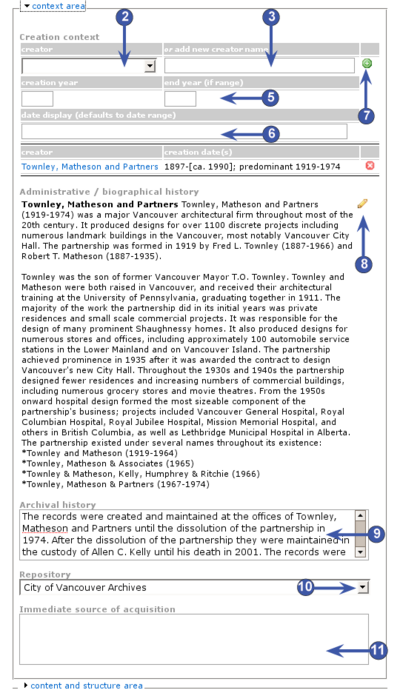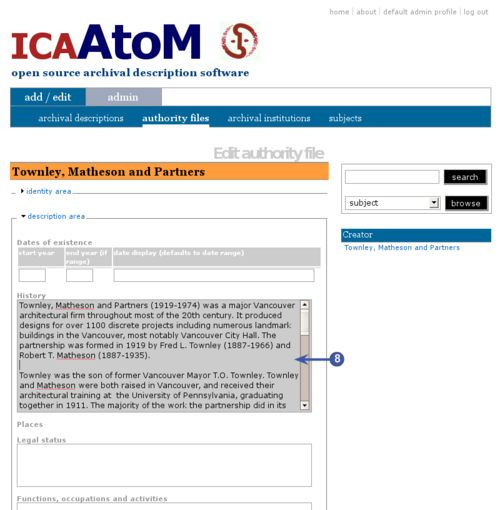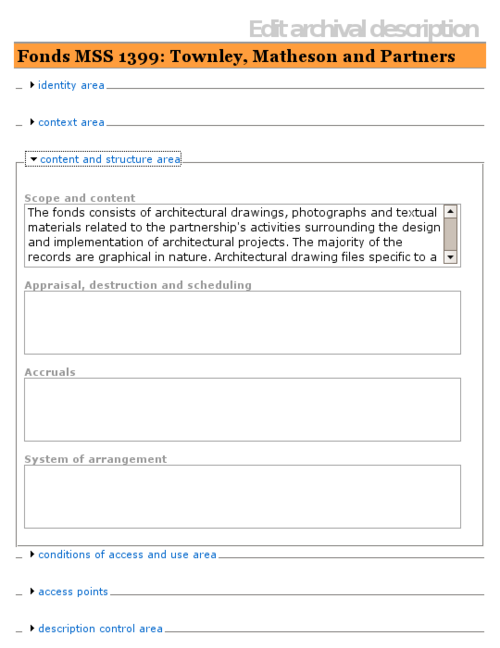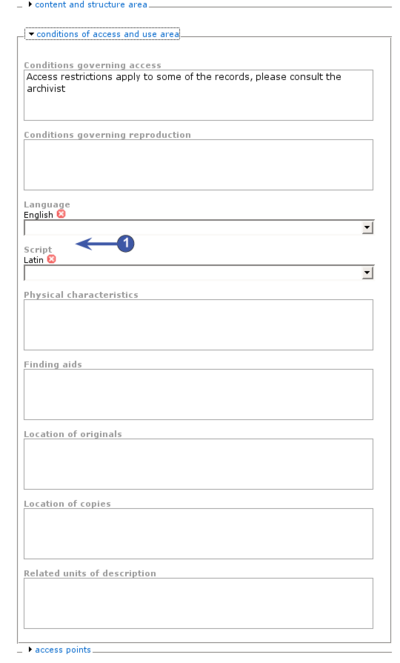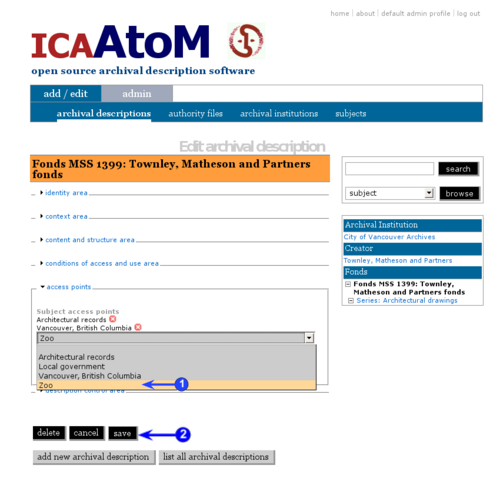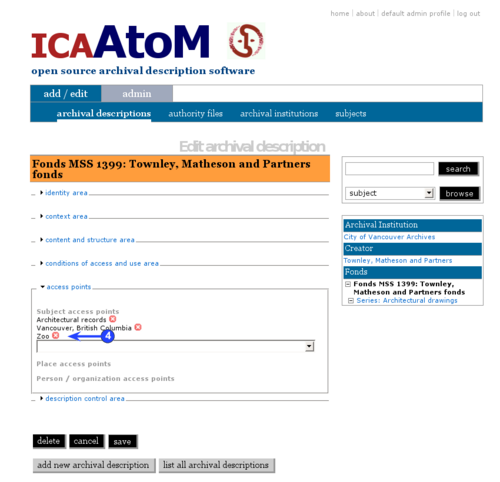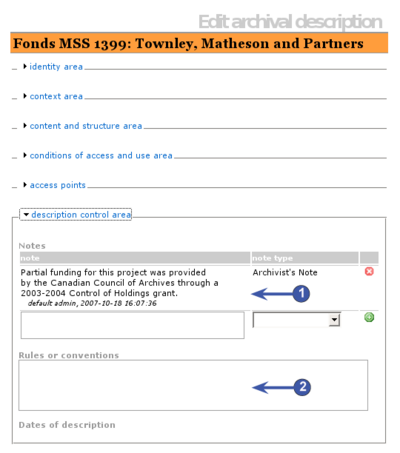Difference between revisions of "Add a new archival institution"
| Line 45: | Line 45: | ||
| − | 7. '''Extent and medium''' ([[ISAD(G)# | + | 7. '''Extent and medium''' ([[ISAD(G)#isad3.1.5|ISAD(G) 3.1.5]]): |
*Enter information relating to the physical size, media, and formats. | *Enter information relating to the physical size, media, and formats. | ||
*Structure data according to your institution's local standards (e.g. separate entries by commas or separate lines). | *Structure data according to your institution's local standards (e.g. separate entries by commas or separate lines). | ||
| + | |||
| + | |||
| + | 8. Note that the [[ISAD(G)]] '''Dates''' element (ISAD(G)#isad3.1.3|3.1.3]]) is implemented by ICA-AtoM in the '''Context area''', where dates are linked to a [[Glossary#Creator|creator]] in a [[Glossary#Event|creation event]]. | ||
<br clear="right"> | <br clear="right"> | ||
| Line 54: | Line 57: | ||
[[Image:um3-1-1ContextArea.png|500px|right|thumb|Archival description: Identity area]] | [[Image:um3-1-1ContextArea.png|500px|right|thumb|Archival description: Identity area]] | ||
| − | The '''ContextArea''' contains fields that provide information about the origins and custody of the archival material being described. | + | The '''ContextArea''' contains fields that provide information about the origins and custody of the archival material being described. '''Date ranges''' are handled in ICA-AtoM as creation [[Glossary#Event|events]]. |
| + | *At the highest [[Glossary#Level of description|level of description]], the [[Glossary#Archival unit|archival unit]] is associated with its [[Glossary#Creator|creator]] over a date range. | ||
| + | *At lower [[Glossary#Level of description|levels]], enter the date range, but leave the '''Creator name''' blank to inherit the [[Glossary#Creator|creator]] from the higher [[Glossary#Level of description|level]]. | ||
| + | *If you want to associate a lower [[Glossary#Level of description|level]] with a [[Glossary#Creator|creator]] different than the higher [[Glossary#Level of description|level]], enter / select a different '''Creator name'''. | ||
| − | 1. | + | 1. '''Creation context''': |
| − | * | + | *Use this area to register a new create [[Glossary#Event|event]] and view existing ones. |
| − | |||
*Register as many creation events as you need. ISAD(G) recognizes more than one type of date (e.g. dates of document creation vs dates of accumulation, see [[ISAD(G)#isad3.1.3 |ISAD(G) 3.1.3]]). And in some arrangement systems there may be more than one creator (e.g. in a series system, a series may be successively controlled by differen bodies over time). | *Register as many creation events as you need. ISAD(G) recognizes more than one type of date (e.g. dates of document creation vs dates of accumulation, see [[ISAD(G)#isad3.1.3 |ISAD(G) 3.1.3]]). And in some arrangement systems there may be more than one creator (e.g. in a series system, a series may be successively controlled by differen bodies over time). | ||
*The first entry in the list (containing empty text boxes) is for registering a new creation event. | *The first entry in the list (containing empty text boxes) is for registering a new creation event. | ||
| Line 65: | Line 70: | ||
| − | 2. | + | 2. '''Creator''' and '''Add new creator name''': |
| − | *Select the creator's name from the drop-down list | + | *Select the [[Glossary#Creator]creator's]] name from the '''Creator''' drop-down list (generated from the names of all existing [[Glossary#Authority record|authority records]]. |
| − | + | *If the [[Glossary#Creator]creator's]] name does '''not''' appear in the list, use the '''Add new creator name''' field to enter the creator's name. | |
| − | *If the creator's name does '''not''' appear in the list, use the | + | *If you select a name from the drop-down list, ICA-AtoM will ignore any text you may have entered in the '''Add new creator name''' field. |
| − | *If you select a name from the drop-down list, ICA-AtoM will ignore any text you may have entered in the | ||
*Note that you can leave both of these field blank; in this case, the unit will inherit creator information from its parent record (next highest level of description). | *Note that you can leave both of these field blank; in this case, the unit will inherit creator information from its parent record (next highest level of description). | ||
*At the highest level of description, you should always include the creator; the <span class="field">Administrative history / biographical sketch</span> is drawn from the creator's authority record. | *At the highest level of description, you should always include the creator; the <span class="field">Administrative history / biographical sketch</span> is drawn from the creator's authority record. | ||
Revision as of 13:34, 30 May 2008
Please note that ICA-AtoM is no longer actively supported by Artefactual Systems.
Visit https://www.accesstomemory.org for information about AtoM, the currently supported version.
Main Page > User manual > UM-3 Add / edit content > UM3.1 Add / edit archival descriptions > UM-3.1.1 Data entry: archival descriptions
Data entry: archival descriptions
The Edit screen for archival descriptions is structured into six [[Glossary#Record area|record areas based on ISAD(G)'s "information areas". Click on a record area to expand it (display fields); click again to collapse it (hide fields). Note that as of ICA-AtoM version 0.6, whenever you save a record ICA-AtoM re-loads the page, collapsing all areas.
The following notes aim only to clarify ICA-AtoM procedures; for guidelines on what information to record in particular fields, consult ISAD(G) as the content standard. The notes are organized by field, with links to the applicable ISAD(G) section(s).
Identity area
The Identity area contains fields that uniquely identify the archival description.
1. Reference code (ISAD(G) 3.1.1):
- Enter the reference code that uniquely identifies the archival unit under description.
2. Title (ISAD(G) 3.1.2):
- Enter the authorized title of the unit of description.
3. Title notes (ISAD(G) 3.1.2, ISAD(G) 3.6.1):
- Enter a note relating to the title if applicable.
- Note that you can add multiple title notes: in the current version of ICA-AtoM (v0.6), you must save the record before you can add another note.
4. Version (ISAD(G):
- Enter the version number of the description if applicable; structure according to local / institutional standards.
5. Level of description (ISAD(G) 3.1.4):
- Select the appropriate level of description from the drop-down list.
- List terms can be customized by administrators to suit their institution's arrangement system.
6. Next upper level of description:
- Select the unit immediately above the current one in the hierarchy of arrangement ("parent record").
- Leave blank if the current unit represents the highest level of arrangement (e.g. a fonds).
7. Extent and medium (ISAD(G) 3.1.5):
- Enter information relating to the physical size, media, and formats.
- Structure data according to your institution's local standards (e.g. separate entries by commas or separate lines).
8. Note that the ISAD(G) Dates element (ISAD(G)#isad3.1.3|3.1.3]]) is implemented by ICA-AtoM in the Context area, where dates are linked to a creator in a creation event.
Context area
The ContextArea contains fields that provide information about the origins and custody of the archival material being described. Date ranges are handled in ICA-AtoM as creation events.
- At the highest level of description, the archival unit is associated with its creator over a date range.
- At lower levels, enter the date range, but leave the Creator name blank to inherit the creator from the higher level.
- If you want to associate a lower level with a creator different than the higher level, enter / select a different Creator name.
1. Creation context:
- Use this area to register a new create event and view existing ones.
- Register as many creation events as you need. ISAD(G) recognizes more than one type of date (e.g. dates of document creation vs dates of accumulation, see ISAD(G) 3.1.3). And in some arrangement systems there may be more than one creator (e.g. in a series system, a series may be successively controlled by differen bodies over time).
- The first entry in the list (containing empty text boxes) is for registering a new creation event.
- Any subsequent entries show events already registered.
2. Creator and Add new creator name:
- Select the [[Glossary#Creator]creator's]] name from the Creator drop-down list (generated from the names of all existing authority records.
- If the [[Glossary#Creator]creator's]] name does not appear in the list, use the Add new creator name field to enter the creator's name.
- If you select a name from the drop-down list, ICA-AtoM will ignore any text you may have entered in the Add new creator name field.
- Note that you can leave both of these field blank; in this case, the unit will inherit creator information from its parent record (next highest level of description).
- At the highest level of description, you should always include the creator; the Administrative history / biographical sketch is drawn from the creator's authority record.
- Lower levels inherit creator information from higher levels: use only if creator is different than the creator of the parent record (next upper level of description).
3. Creation year / End year (ISAD(G) 3.1.3):
- Enter the opening and closing years of the date range.
- ICA-AtoM uses these values for sorting and searching purposes.
- Use only four-digit numbers.
- If the start and end years are the same, enter only in the start year and leave the end year blank.
- Complete at lower levels of description even if you are leaving the Creator name field blank (e.g. when describing a series, you do not need to repeat the Creator name from the fonds description, but you do need to enter the date range of the series).
- Do not use any qualifiers here (e.g. "ca.") or typographical symbols (e.g. "[194?]") to express uncertainty (see step4).
4. Date display ( ISAD(G) 3.1.3):
- Enter the date range as you want it to appear to the viewer.
- Add any additional text to qualify date range (e.g. "ca. 1940-1980" or "[1940]-1980; predominant 1973-1980").
- Whereas Creation year and End year are used internally for database searching and sorting purposes, this field is for display purposes.
5. (green +):
- Click to register the creation event.
- Behind the scenes, ICA-AtoM creates a related record in the Event table and displays it as the next entry in the list.
- If you selected an existing authority record as the Creator field in step2, ICA-AtoM provides a link to the creator's authority record (blue text).
- If you entered a new name in the Add new name field, ICA-AtoM creates a new authority record for that entity and provides a link to it (blue text).
6. (red X):
- Click to delete an existing creation event.
7. Administrative / biographical history (ISAD(G) 3.2.2):
- Text block displaying data from the creator's authority record.
- If you have registered more than 1 creator in the creator events (see steps 1-5), the administrative histories / biographical sketches of each will appear here sequentially, separately by a line (horizontal rule).
- Because the data actually resides in another record in another table, it cannot be directly edited here; to edit, click the (see step8 below).
8. (pencil):
- Click to edit the Administrative / biographical history field; ICA-AtoM routes you to the related authority record.
- Make changes and save; ICA-AtoM returns you to the Edit archival description screen.
- Note that upon return all RecordAreas are collapsed.
9. Archival history (ISAD(G) 3.2.3):
- Enter information relating to the history of custody over the material being described.
10. Repository:
- Select from the drop-down list the institution that holds the archival material under description.
- ICA-AtoM generates the list from existing archival institution records.
- Typically you need only enter this information at the highest level of description (e.g. the fonds or collection; series in a series system); it can be left blank at the lower levels if they are all stored in the same repository.
11. Immediate source of acquisition (ISAD(G) 3.2.4):
- Enter information relating to the circumstances leading to the acquisition of the material by the archival institution.
|width="40%" align="right"|
|}
Content and structure area
|
The ContentAndStructureArea contains fields that provide information relating to the content and arrangement of the materials under description. These are all basic text fields. For practical purposes there are no limits on field length (fields can hold up 16 million characters); scroll arrows will appear if needed.
|
Conditions of access and use area
|
The ConditionsOfAccessAndUseArea contains fields that provide information about the availability of the material being described. Most of the fields in this area are basic text fields; the exceptions are Languages and Scripts (see steps 3 below).
|
Access points
|
The AccessPoints area links archival descriptions to terms drawn from controlled vocabularies as a means of facilitating acess and retrieval. As of version 0.5, ICA-AtoM can create Subject access points; future releases should include Place and Name access points.
|
Description control area
|
The DescriptionControlArea contains fields that provide information about the creation and maintenance of the description record.
|
